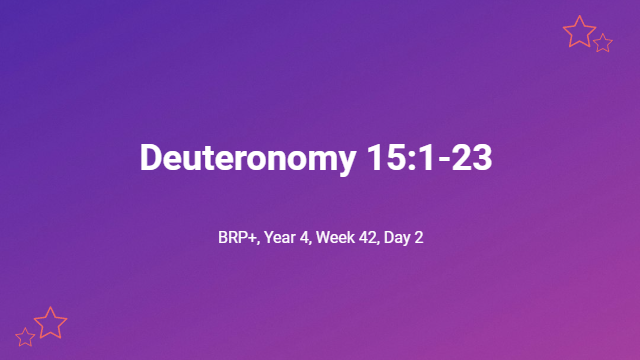Deuteronomy 15:1-23
Q.1. How would God bless the extension of grace to debtors? Why were the people to give favourable treatment to their neighbours? – (Dt.15:1-6 c.f. Gal.6:9-10)
God commanded His people to forgive all debts owed by fellow Israelites every seven years. The giving of forgiveness came with a divine blessing – 4 … there will be no poor among you, since the Lord will surely bless you in the land which the Lord your God is giving you as an inheritance to possess, 5 if only you listen obediently to the voice of the Lord your God, to observe carefully all this commandment which I am commanding you today (Dt.15:4-5). God’s reward for such grace would result in economic blessing – 6 For the Lord your God will bless you as He has promised you, and you will lend to many nations, but you will not borrow; and you will rule over many nations, but they will not rule over you (Dt.15:6). Their generosity was to be a reflection of God’s goodness in giving them the Promised Land – You shall remember that you were a slave in the land of Egypt, and the Lord your God redeemed you; therefore I command you this today (Dt.15:15 c.f. 15:4). The releasing of their debtors from their debts was for good reason – So then, while we have opportunity, let us do good to all people, and especially to those who are of the household of the faith (Gal.6:10 c.f. Dt.15:3).
Q.2. What was to characterize the relationships of the Israelites toward each other? Why were the people to be generous toward others? – (Dt.15:7-11)
Israel was to keep a compassionate heart toward their own people – but you shall freely open your hand to him and shall generously lend him sufficient for his need in whatever he lacks (Dt.15:8). Moses reminded the people of both negative and positive consequences of failing to help the needy (i) – 9 … then he may cry to the Lord against you, and it will be a sin in you. (ii) 10 You shall generously give to him, and your heart shall not be grieved when you give to him, because for this thing the Lord your God will bless you in all your work and in all your undertakings (Dt.15:9-10).
Q.3. How were debtors to be treated? Why? Under what circumstances were slaves to not be set free? – (Dt.15:12-18)
Not only were debtors just to be set free the seventh year – 13 When you set him free, you shall not send him away empty-handed. 14 You shall furnish him liberally from your flock and from your threshing floor and from your wine vat; you shall give to him as the Lord your God has blessed you (Dt.15:13-14). What if a servant had grown attached to his master and ended up with a better life, thus preferring to stay under his care – then you shall take an awl and pierce it through his ear into the door, and he shall be your servant forever. Also you shall do likewise to your maidservant (Dt.15:17).
Q.4. Where were the firstlings of the flock to be eaten? Why? What other rules applied to eating meat? – (Dt.15:19-23)
As in Chapter 14, the firstlings of the flock had to be unblemished, and the offerings taken to Jerusalem – You and your household shall eat it every year before the Lord your God in the place which the Lord chooses (Dt.15:20 c.f. 15:21; 14:23 & 25). This meant that the Israelites would regularly focus their thoughts upon God. All other meat could be eaten within the gates of their tribal area. However, the blood was sacred and was not to be consumed – Only you shall not eat its blood; you are to pour it out on the ground like water (Dt.15:23).

